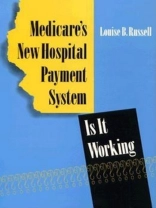In 1983 Congress changed the way Medicare pays for hospital care. Under the new prospective payment system, hospitals are paid a fixed rate, set in advance, to cover a patient’s stay. If costs are less than the fixed rates, the hospital keeps the profit; if the costs are more, it absorbs the loss. From the beginning, prospective payment was recognized as a revolutionary change in Medicare. Congress wanted a system that would make federal expenditures more predictable and controllable, and expected hospitals to respond by becoming more efficient. Some observers have hailed it as a successful way to control the spiraling costs of the Medicare program. Others have criticized it as arbitrary and a threat to the health of the elderly.In the six years since prospective payment was introduced, a substantial amount of evidence has accumulated about its effects. Russell looks at the major characteristics of the rate payment system, how it has changed the pattern of medical service, how these changes have affected the health of the beneficiaries, and the system’s effects on Medicare outlays. She reviews what is known and what needs to be learned to arrive at a valid assessment of the system. Moreover, she contributes to the larger debate on Medicare by making what are frequently quite technical evaluations accessible to the general public.
Louise B. Russell
Medicare’s New Hospital Payment System [EPUB ebook]
Is It Working?
Medicare’s New Hospital Payment System [EPUB ebook]
Is It Working?
Acquista questo ebook e ricevine 1 in più GRATIS!
Lingua Inglese ● Formato EPUB ● ISBN 9780815718864 ● Casa editrice Brookings Institution Press ● Pubblicato 2010 ● Scaricabile 3 volte ● Moneta EUR ● ID 9039875 ● Protezione dalla copia Adobe DRM
Richiede un lettore di ebook compatibile con DRM












